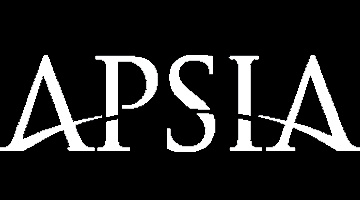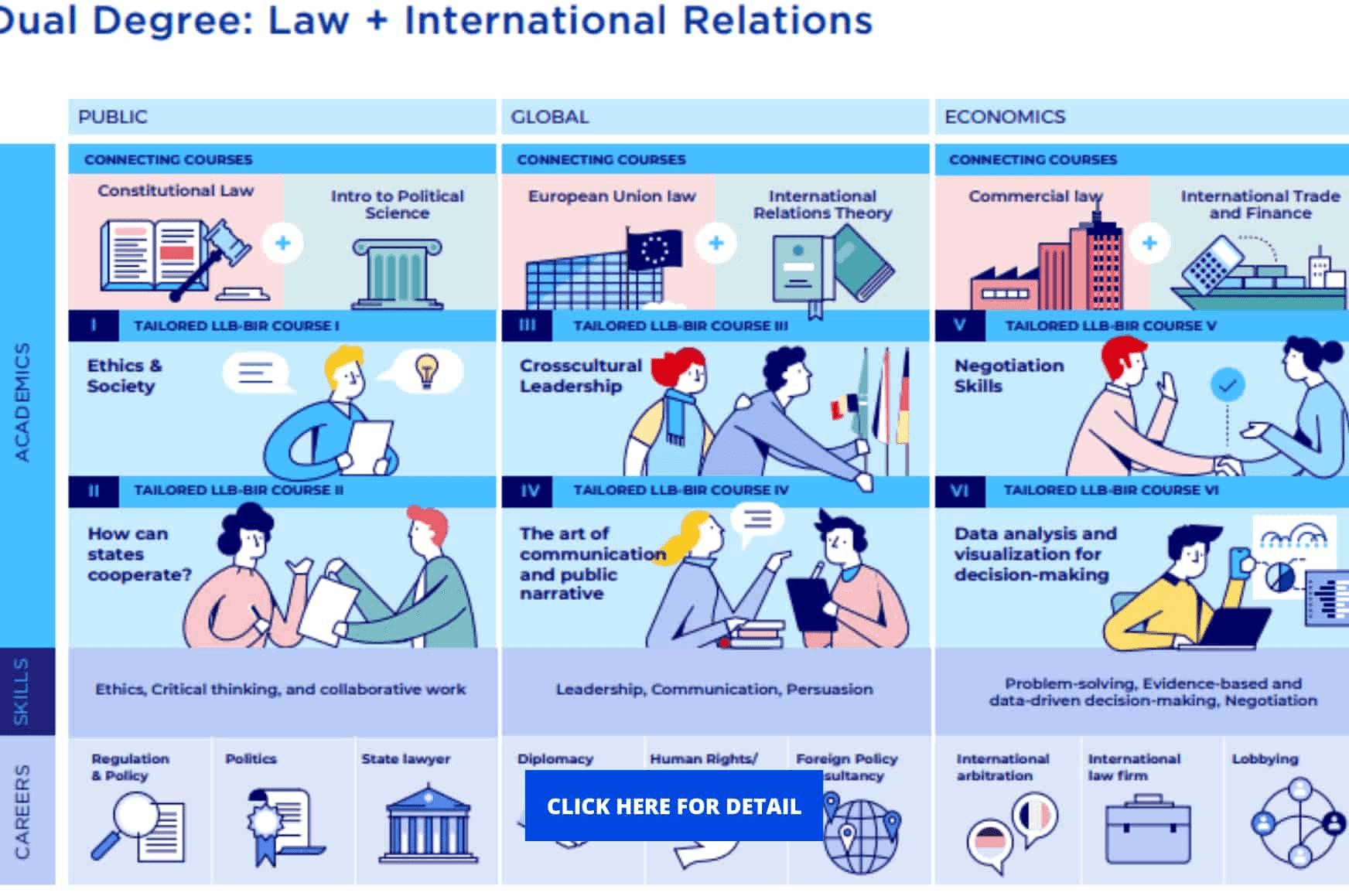
Dual Degree in Laws & International Relations
- Home
- Studies
- Undergraduate Degrees
- Dual Degree In Laws & International Relations
A UNIQUE Dual Degree in Laws & International Relations
The study plan for the Dual Degree in Laws & International Relations at IE University has been designed with the prestigious academic experience at its core, our academic faculty’s expert knowledge and research in each area, and the linkages between the University and the professional world.
The Dual Degree in Laws & International Relations aims to teach young ambitious individuals to build the proper skill set to become professionals capable of facing real-world challenges.
Through our hands-on teaching methodology, students from the Dual Degree in Laws & International Relations will find the perfect ideal balance between what is studied throughout their degree and the projects that are applied based on real-world scenarios.
This will aid them to develop profiles that are able to adapt to new trends happening now in the 21st century.

Dual Degree in Laws & International Relations Study plan
LEARN MORE ABOUT OUR Dual Degree in Laws & International Relations

FIRST YEAR
Your first year starts with a broad introduction to international affairs and law as a whole. You will develop the skills required to understand the historical evolution of the common legal background of Europe. Through a comparative legal methodology, you will become familiar with the principles of Constitutional Law, Private Law, Civil Law and Political Theory, a process that involves an initial analysis of different law systems adopted worldwide, and a good understanding of the laws that govern relationships among states, international organizations, and other global players. You will also learn about the foundations of international affairs, studying subjects such as Political Science, Introduction to Economics, Political Theory and History of International Relations.

SECOND YEAR
The innovative and practical learning approach continues into your second year, where you will acquire the necessary skills to understand and apply civil law by using comparative analysis, as well as connect them to other relevant areas of law such as Family, Estate, Trust, Property and Contracts Law. Through International Relations Theory, Multicultural Diplomacy and Communication and International Political Economy, you will obtain an in-depth view of the legalities of business and commercial activities and learn to apply economic theory to the method and practice of law. During this year you will also take Comparative Politics, which will acquaint you with foundational texts of political thought, and to compare politics on an economical and international scale.
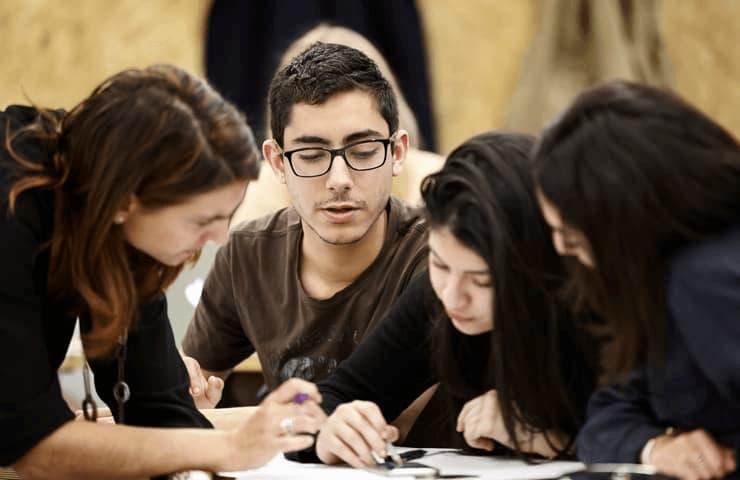
THIRD YEAR
During your third year, you will be provided with methodological and practical tools to understand and evaluate arguments about contending issues in International and economic affairs. From a business perspective, you will be introduced to International Trade, Commercial Law and Corporations, Alternative Dispute Resolution and Law and Economics. You will study different ways of comprehending globalization in the contemporary world. From a comparative and international perspective, you will be introduced to Taxation, Public International Law and Topics in Foreign Topics.

FOURTH YEAR
During this year, you will personalize your student path by choosing complementary courses, traveling abroad for an exchange or completing an internship program with one of our prestigious partner institutions around the world. The complementary courses will develop the soft skills and ethical attitudes that will allow you to become a legal and international professional. During this year through Law Unplugged, you will experience the reality of the legal practice by the simulation of different legal professions and markets in the global economy. By the end of the year you will have acquired the skills to apply economic theories to your projects, develop critical thinking, and practice the most important competencies related to leadership.

FIFTH YEAR
In your last year, you will delve into Litigation and develop critical thinking capacities by analyzing topics that will appear during your legal practice, such as Criminal Law, Labour Law or Peace and Conflict Resolution. You will also acquire the skills that leaders use to resolve conflicts and manage multinational corporations. Such as Project Management, Global Governance and International Institutions, Aid, Development and Social Entrepreneurship. An important part of your fifth year will be dedicated to your final project, drawing upon the knowledge gained throughout your academic courses, internships, IEU Labs, and exchange program.
Learning a new language can open up a world of new opportunities
IE University considers multiple language acquisition to be a key element of its educational model, leading to success in both work and study.
The Language Center at IEU is proud to offer students the possibility to study a wide range of languages, including French, German, Portuguese, Chinese, Arabic, Spanish, and English. With such a large variety of options, our students are able to personalize their academic path to meet their future career plans and objectives.

The Language Center at IEU
The Language Center helps students develop their multilingual communicative skills to help them flourish in the international labor market.
Acreditations

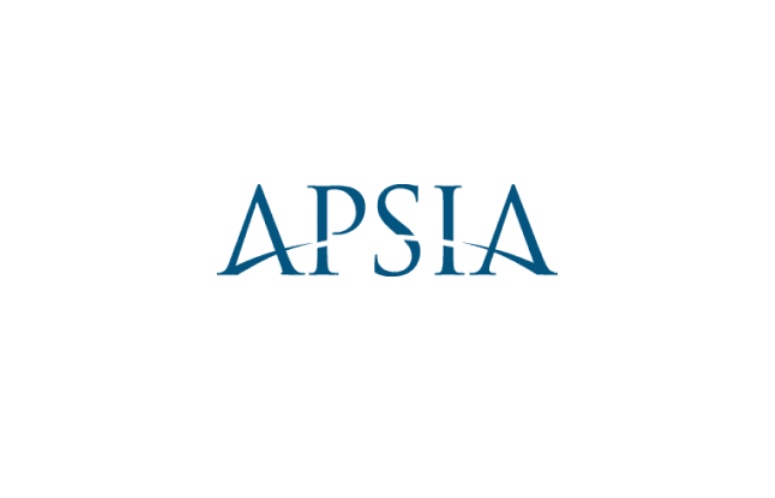
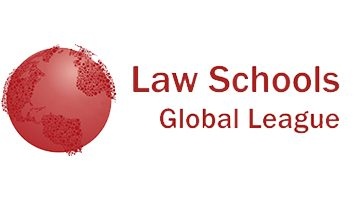

COMPETENCES
Basic competences
GENERAL COMPETENCES
- Know and understand the elements, structure, resources, interpretation and application of the legal system and be able to interpret the sources and fundamental legal concepts of each of the different systems.
- Know and understand the mechanisms and procedures for resolving legal disputes, as well as the legal position of individuals in their relations with administrative bodies and with the public authorities in general.
- Know and understand how to apply the sources’ priority criteria so as to determine the applicable rules in each case, especially criteria related to compliance with constitutional rules, principles and values.
- Interpret legal texts from an interdisciplinary perspective using legal principles and social, ethical and deontological values and principles as analytical tools.
- Deliver convincing legal arguments on theoretical questions concerning various legal matters.
- Solve case studies in accordance with current statutory law, which implies the prior preparation of material, the identification of problematic issues, the selection and interpretation of the applicable law and a reasoned explanation for those choices.
- Manage the legal language and terminology of the different branches of the law with skill and precision: Draft legal documents in an orderly and understandable manner. Communicate ideas, arguments and legal reasoning both orally and in writing using the appropriate records in each context.
- Use information and communication technologies to search for and obtain legal information (legislation and jurisprudence databases, bibliographies, etc.), and as tools for work and communication.
- Develop arguments that demonstrate a critical understanding of political and social phenomena.
- Apply the knowledge acquired to develop interpretations of current economic phenomena and argue the case.
- Make use of historical and current documentary sources.
- Develop the technical IT competences necessary for a professional setting.
- Present a global vision with regards to trends and debates in international relations.
- Evaluate the economic dimension of international public and private policies.
- Plan and implement public and private policies at the international level, providing justification for their implementation.
- Use different information sources and channels to create and convey information, ideas, problems and solutions related to current international affairs.
- Train to conduct research and studies on the international sphere and its political, economic, social and cultural facets.
- Possess a critical understanding of the legal implications of international relations.
- Develop public- and private-sector strategies for real economic contexts.
- Communicate orally and in writing in both Spanish and English in a professional and academic context.
- Analyze and consider contemporary challenges and the social and cultural complexity of globalized society through a critical and creative lens.
- Apply suitable ethics-based judgements to all professional activities and relationships, with the ability to differentiate between personal and professional life.
- Apply and adapt knowledge and competences to a variety of international academic and professional contexts.
- Develop flexible problem-solving tools for organizational management that take the satisfaction of different stakeholders into consideration.
PROGRAM-SPECIFIC COMPETENCES
- Acquire a critical understanding of the historical foundations and principles of private and public statutory law.
- Analyze the different branches of law from the perspective of their economic, political or social functions.
- Understand the basic principles of certain non-legal matters concerning the regulation of the different branches of law, and which are important for the attainment of a multidisciplinary education.
- Apply abstract reasoning and analytical competences so as to understand economic, political and social contexts and formulate solutions to complex problems in multidisciplinary settings.
- Promote constitutional and democratic values, the principles of the rule of law and the protection of fundamental rights as a representative of the legal profession.
- Analyze the institutions of public and private law.
- Achieve a comparative perspective of law and understand the evolution of civil and common law systems on a global level.
- Identify and determine the scope of legislative changes in each area.
- Understand the main public and private institutions, their genesis and interconnection, as well as the procedures of their activities and the guarantees they provide.
- Identify, formulate and solve substantive and procedural issues related to the different branches of public law.
- Understand legal phenomena on a supranational level.
- Develop analytical and practical competences in the resolution of cases of international and European law.
- Acquire negotiation and reconciliation competences in the legal sphere.
- Think creatively and develop new ideas and concepts in the field of law.
- Understand classical and contemporary political theories.
- Analyze and compare the structure and functioning of the main political systems.
- Recognize the paradigms, concepts and principles of political science.
- Understand microeconomic and macroeconomic models and obtain specific information from them.
- Be capable of identifying the key aspects of an economy and the operation of local and global markets.
- Understand international relations’ evolution as a discipline by placing it in the corresponding political, economic, legal and social contexts.
- Understand the historical dimension and evolution of the political and social processes hitherto in play in international relations.
- Produce, gather, analyze and interpret data and statistics.
- Understand the concepts, framework of application and theoretical foundations of international relations.
- Justify political and social stances in line with the discipline’s different theories.
- Understand the relationships between the different stakeholders in play as a function of a region’s current economic policy model.
- Understand the legal aspects and decision-making processes used as a part of nations and international organizations’ foreign policies in accordance with international law.
- Evaluate cases related to international jurisdiction, applicable law and the recognition and enforcement of judgements.
- Understand the structure, organization and operation of different types of international and supranational institutions, with particular focus on the European Union and the challenges it will face in the future.
- Analyze the course of global issues such as international terrorism, challenges in health and education and development cooperation.
- Understand and analyze the international economic environment and the economic dimension of international institutions using economic and financial tools in line with a given policy direction.
- Analytically connect past and current knowledge and processes through interdisciplinary analysis.
- Design communication strategies and apply political communication techniques.
- Apply the knowledge acquired to experimentation and the generation of new knowledge.
- Integrate and deploy all knowledge acquired throughout the program.
TRANSVERSAL COMPETENCES
- Develop decision-making competences and an entrepreneurial mindset.
- Create collaboration plans for partnerships between public and private institutions.
- Identify the main cultural identity traits that characterize today’s world by understanding the main contemporary ideological trends.
- Behave professionally in accordance with the core principles and ethics of the profession.
- Manage unforeseen situations by being able to adapt to organizational changes.
- Use knowledge of the discipline to analyze and evaluate current situations.
- Form a part of interdisciplinary and multicultural teams to achieve shared goals in a diverse environment.

